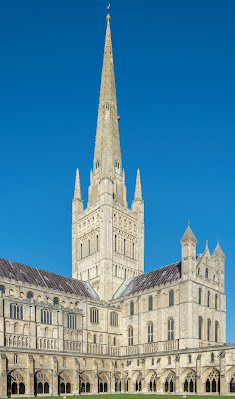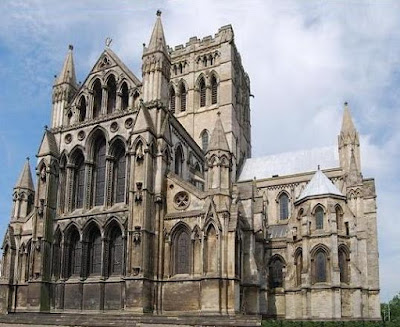 |
| Norwich Cathedral – Photo: JackPeasePhotography CC BY 2.0, Wikimedia |
Britten: Hymn to the Virgin, John Tavener: Hymn to the Mother of God, Judith Weir: Ave Regina Cælorum, James MacMillan: The Culham Motets, O Virgo Prudentissima, Palestrina: Missa Papae Marcelli; BBC Singers, cond. Sir James MacMillan, Roman Catholic Cathedral, Norwich.
Wagner: Siegfried Idyll; Hummel: Trumpet Concerto, Arvo Pärt: Fratres; Beethoven: Symphony No.1; Imogen Whitehead, trumpet; Britten Sinfonia, Clio Gould, violin/director, Norwich Cathedral
Reviewed by Tony Cooper: 23/24 May 2025
The BBC Singers’ concert formed part of their centenary celebrations while the Britten Sinfonia saluted Estonian composer Arvo Pärt in his 90th year.
First mentioned in the Oxford Dictionary of Music in 1747, held on a triennial basis (originally with Birmingham and Leeds) from 1824 through to 1988 and then put on an annual footing thereafter, the Norfolk & Norwich Festival ended on a high with a couple of engaging and heartwarming concerts held across the city’s two cathedrals – the Roman Catholic Cathedral dedicated to St John the Baptist and Norwich Cathedral dedicated to the Holy and Undivided Trinity, featuring the BBC Singers, conducted by Sir James MacMillan, and Britten Sinfonia, directed by Clio Gould.
It was heart-warming, too, having James MacMillan back in Norwich after a long absence conducting the BBC Singers, recently awarded the Royal Philharmonic Society’s prestigious Ensemble Award, proving a nice touch in their centenary year.
 |
| Norwich Roman Catholic Cathedral Photo: Nigel Chadwick, CC BY-SA 2.0, Wikimedia |
They opened with a lovely and tender reading of Britten’s Hymn to the Virgin, an early example of Britten’s mastery of word setting which received its first performance on 5 January 1931 at St John’s Church, Lowestoft. He was 16 at the time, unwell and approaching his last days at Gresham’s School in north Norfolk confined to the school infirmary where he passed has time reading John Buchan (Prester John) and swotting Chaucer for his up-coming exams.
A fine bunch, the BBC Singers must have sung Hymn to the Virgin dozens of times but, nonetheless, their timing and freshness of the piece remains constant and was joyously heard in the expansive Gothic-style surroundings of Norwich’s Roman Catholic Cathedral grandly designed by the eldest son of George Gilbert Scott.
The text Britten used was by an anonymous poet, probably dating from about 1300, written in a macaronic verse where one language is introduced into the context of another. Therefore, the main body of the choir sings in Middle English while the semi-chorus supplies a refrain in Latin.
In stark contrast to Britten came John Tavener’s Hymn to the Mother of God, a companion piece to Hymn for the Dormition of the Mother of God written in 1985. Both pieces are based on texts from the Liturgy of St Basil and the Feast of the Dormition of the Mother of God respectively. The BBC Singers sang superbly capturing the strong textured musical style of the Eastern Orthodox Church clearly punctuating the composer’s writing style with deep bass lines formulating the work’s spiritual strength.
I was pleased to hear a performance of Judith Weir’s Ave Regina Cælorum, a lovely and agreeable piece commissioned by Merton College, Oxford, as part of the Merton Choirbook, a collection of music celebrating the college’s 750th anniversary and first performed in 2014 at Gloucester Cathedral as part of the Cheltenham Music Festival performed, of course, by the Choir of Merton College conducted by Benjamin Nicholas who has done wonders with the choir of Merton since taking up his post in 2008 and becoming the first full-time organist and director of music at Merton in 2012.
A couple of works by James Macmillan offered an extra dimension to the programme overall – The Culham Motets and O Virgo Prudentissima. Comprising five items, the The Culham Motets were written for the chapel of Christ the Redeemer at Culham Court near Henley-on-Thames, a beautiful, award-winning new Catholic chapel designed by the Craig Hamilton architectural practice dating from 2010. Greatly inspired by Greek temple outlines, the chapel is an outstanding example of contemporary architecture perfectly situated and inspiring to those visiting and using it for worship.
The BBC Singers added so much strength and character to the piece delivering as perfect a performance as one could possibly achieve with the soprano and tenor solos adding so much pleasure to the overall performance highlighting how good the acoustic properties of St John’s are for choral singing.
Immediately following came a lovely and inviting rendering of O Virgo Prudentissima, Macmillan’s joyful and inviting setting of a tiny fragment from the Eton Choir Book by Robert Wylkinson. The BBC Singers showed more than their worth delivering an immaculate performance comprising melodic fragments in contrast to the closed-mouth sounds coming from a coterie of singers weaving their way into fully-fledged phrases with humming sounds.
A feature central to the work, the humming sounds offer sopranos and altos a heterophonic haze where multiple voices engage in different versions of the same melody simultaneously thus creating an ‘abstract’ or ‘hazy’ sound as the variations come together. The ending was serene and uplifting with the BBC Singers delivering a joyous, uplifting and elongated ‘Alleluia’.
The final offering of such a rewarding and gifted programme was Giovanni Pierluigi da Palestrina’s Missa Papae Marcelli, one of the composer’s best-known masses named after Pope Marcellus II who reigned for just three weeks in April 1555. The mass was traditionally sung at the papal coronation until John Paul I and his successors abandoned this ceremony. Such is politics. Amen!
The final concert of the N&N Festival 2025 held in Norwich Cathedral fell to the Britten Sinfonia directed from the violin by Clio Gould who led the string section of this fine orchestra in the delicate and serene opening bars of Wagner’s Siegfried Idyll written in 1870 to celebrate his wife’s birthday on 24 December – an early Christmas present!
At the time the Wagners were living at Villa Tribschen, in Lucerne, Switzerland. Therefore, it was here that she was awoken to music being played outside of her bedroom which Cosima described as a ‘Symphonic Birthday Greeting’ and by Wagner as the ‘Tribschen Idyll’.
A comforting 17-minute work it features family lullabies and other musical references that were known only within the Wagner household. The original 13-member chamber orchestra that played the work on the stairs of Villa Tribschen was made up of members of the Tonhalle Orchestra Zürich.
Wagner always intended the work to be a private present to Cosima but in 1876, when he needed a bit of cash, he sold it to his publisher and in doing so re-edited it to enlarge the orchestral part to 35 members to make it marketable to more standard-size orchestras and, therefore, just the right musical forces for the Britten Sinfonia whose performance more than captured the essence and symphonic values of Wagner’s special birthday gift to his wife of four months while stating his true love for her.
The first half of the concert ended with Britten Sinfonia’s principal trumpet, Imogen Whitehead, soloist in Johann Hummel’s popular Trumpet Concerto written in 1803 for Viennese virtuoso, Anton Weidinger. A three-movement work it’s the last movement that allows the soloist to really show off and Ms Whitehead did just that putting in a spirited, dazzling and technically-assured performance offering a host of virtuoso passages which Ms Whitehead sailed through in such a relaxed manner while Hummel quotes the march from Cherubini’s opera, Les deux journées, thereby putting the icing on the cake much to the pleasure and satisfaction of a packed house.
As part of Britten Sinfonia’s celebrations of Estonian composer Arvo Pärt’s 90th birthday, their concert included a rarely performed version of Fratres (‘Brothers’) scored for wind octet and widely regarded as one of his most celebrated works which has been featured in more than a dozen films including The Place Beyond the Pines and There Will Be Blood.
A sombre and haunting piece of just eight minutes in length, Fratres harbours a distinctive sound with a sense of power and mysticism wrapped round the work offering the audience a short but effective spiritual journey wherever their thought processes took them during performance. From my perspective, I was lost in deep thought gazing at Norwich Cathedral’s Great West Window admiring scenes from the Old and New Testament.
And with Hummel’s career spanning the transition between the classical and romantic eras it was a clever move by the Britten Sinfonia in programming Beethoven’s Symphony No.1 in C which firmly established the composer in the tradition of the classical symphonic style of his predecessors and idols, Haydn and Mozart.
And with Beethoven’s own voice shining throughout the score, particularly in the way he uses tricks and turns in the last two movements, it highlighted and showed the prowess and musicality of the fine bunch of players that make up the Britten Sinfonia. They did full justice to Beethoven’s first symphonic work delivering an exemplary and thrilling performance ending yet another successful Norfolk & Norwich Festival.
The blog is free, but I’d be delighted if you were to show your appreciation by buying me a coffee.
Elsewhere on this blog
- Powerful stuff: Opera North’s concert staging of Verdi’s Simon Boccanegra, an evening filling the Royal Festival Hall with drama – opera review
- Something juicy that you can get your teeth into: composer Libby Croad chats about The Brontë Suite which gets its UK premiere in June – interview
- Colour & imagination: Rameau’s Pigmalion plus music from Les Boréades, Early Opera Company at Temple Music – opera review
- A near-perfect triptych: in Paris, Christof Loy conjures atmosphere inspired by film for Puccini’s Il Trittico conducted by Carlo Rizzi – opera review
- A carefully curated programme rather than a disc to dip into: Christopher Gray on his first disc with the Choir of St John’s College, Cambridge – interview
- A Hoffmann to remember: Angela Denoke’s production of Offenbach’s final masterpiece at Oldenburg Staatstheater with Jason Kim – opera review
- Requiem A is much more influenced by Swans, Godspeed You! Black Emperor, & Sigur Rós: composer Sven Helbig in his new work – interview
- A conversation between similarities & differences: Jonathan Sells on his disc of Bruckner & Gesualdo with the Monteverdi Choir – interview
- The sheer joy of performing together: Music in Secondary Schools Trust’s 12th Annual Concert – concert review
- Making connections between styles & eras: violinist Holly Harman & friends launch their album Ground – concert review
- Home









